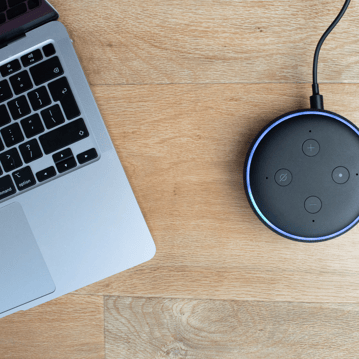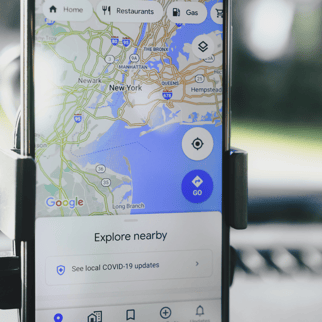Artificial intelligence is changing Search Engine Optimization as we know it, not only with ChatGPT - a new way for people to look for information - but also through expanded optimization capabilities. SEO and AI are partners in crime when it comes to improving the visibility of your business. AI handles the technical side and SEO provides the creative genius. SEO's understanding of user intent, content optimization, and keyword research is the driving force behind AI's successful search algorithms. Together they provide the perfect mix for creating captivating content, which leads to high-ranking websites and an engaged audience. SEO leans on AI's ability to analyze vast amounts of data, while AI relies on SEO's potential to drive organic traffic.
Case Study: Google
Google extensively uses AI throughout its search ecosystem. Notable AI-powered features, such as Google's RankBrain, BERT, Google Discover, and Google Assistant, exemplify the impact of AI on search engines. As of May 2023, 93% of all search queries conducted across all search engine providers are done through the internet giant. Google has been using AI for years through RankBrain and Google Maps software, to provide users with the best possible answers to their search queries. RankBrain uses machine learning to understand search queries and improve search results. BERT (Get Ready… Bidirectional Encoder Representations from Transformers) is an AI model used by Google to better understand the context of words in queries, so they can deliver more relevant results. Google Discover is a personalized content recommendation feature that utilizes AI algorithms to present relevant articles, news, and topics based on user interest and browsing behavior. Google Assistant is a virtual assistant that utilizes Natural Language Processing (NLP) and machine learning to provide personalized responses and perform tasks based on voice commands. The Google ecosystem is the perfect example of how AI is integrated into search engines to improve search relevance, deliver personalized experiences, and enhance overall search performance.
AI-Driven SEO
AI automates various SEO tasks, from keyword research, and content generation, to link analysis. Automating mundane tasks frees up more time to dive into strategic planning and optimization. The power of SEO automation also assists in pinpointing technical issues, improving website speed, and enriching user experiences. AI can make a big difference in SEO efforts when paired with your expertise and strategic decision-making. Over 65% of senior marketing executives believe that AI-powered data analysis improved their decision-making process. Understanding AI’s capabilities will help you interpret AI-generated insights, and apply them effectively in your SEO strategies to achieve impressive results.
1. AI in Search Engine Algorithms
AI plays a leading role in enhancing search engine algorithms, search relevance, personalization, and the overall search experience. By sorting through giant sums of data, including search engine data, user behavior, and website analytics, AI algorithms provide practical insights into keyword trends, user intent, and search patterns. This data-driven approach helps optimize SEO strategies and improve overall website performance. Through NLP, search engines can comprehend the context of web content, leading to more accurate and relevant search results. NLP enables search engines to understand search queries in a more natural and conversational manner. By understanding context, intent, and semantic relationships, search engines can provide more relevant search results. AI algorithms do this by analyzing user engagement signals, enabling search engines to prioritize useful content for each unique user. All of this leads to an increased level of personalization, as it leverages user data and behavior to deliver personalized search results tailored to individual users. This is great news for marketers because 80% of consumers are more likely to make a purchase when brands offer personalized experiences.
2. Natural Language Processing (NLP) and SEO
 By now you know that AI and SEO’s collaboration transforms keyword research, content optimization, and personalized search results. Through NLP algorithms, AI can comprehend everything from search queries to user behavior, allowing you to uncover relevant keywords and tailor content to align with your audience. NLP-based tools provide insights into patterns, behavior, and semantics. AI-powered analytics tools interpret clickstream data, enabling optimized web pages and enhanced user experiences. Sentiment analysis tools help gauge user satisfaction and give you the information you need to adapt your SEO strategy accordingly. With the rise of voice search, it’s important to optimize for conversational queries, long-tail keywords, and featured snippets. Over 41% of adults in the US use voice search daily. Focus on local SEO, mobile optimization, and the use of structured data to enhance voice search visibility. After all, voice search is used by 58% of consumers to find a local business. By embracing these advancements, you can stay competitive and provide seamless user experiences.
By now you know that AI and SEO’s collaboration transforms keyword research, content optimization, and personalized search results. Through NLP algorithms, AI can comprehend everything from search queries to user behavior, allowing you to uncover relevant keywords and tailor content to align with your audience. NLP-based tools provide insights into patterns, behavior, and semantics. AI-powered analytics tools interpret clickstream data, enabling optimized web pages and enhanced user experiences. Sentiment analysis tools help gauge user satisfaction and give you the information you need to adapt your SEO strategy accordingly. With the rise of voice search, it’s important to optimize for conversational queries, long-tail keywords, and featured snippets. Over 41% of adults in the US use voice search daily. Focus on local SEO, mobile optimization, and the use of structured data to enhance voice search visibility. After all, voice search is used by 58% of consumers to find a local business. By embracing these advancements, you can stay competitive and provide seamless user experiences.
3. Content Creation and Optimization with AI
AI-generated content has the potential to nurture your SEO efforts by providing large volumes of content quickly and optimizing it for keywords and user preferences. AI can analyze and suggest improvements for content optimization, keyword targeting, and metadata generation. AI can even generate content itself. However, it's crucial to balance AI-generated content with creativity and quality assurance to maintain authenticity. Your oversight ensures you don’t lose your voice as a company. The uniqueness, accuracy, and relevance of your content are still fundamentals of a strong brand. Creating the right environment for engaging content is about leveraging the benefits of AI-generated content without losing the quality and engagement of successful SEO.
4. AI and Technical SEO
AI plays a significant role in website crawling, indexing, SEO audits, error identification, site speed optimization, and mobile-friendliness. AI algorithms optimize the crawling process by prioritizing important pages, avoiding duplicate or low-value content, and adapting to website changes and user behavior. Intelligent indexing is achieved by analyzing content, identifying semantic relationships, and categorizing web pages based on relevance and intent. This ensures that search engines are accurately understanding and retrieving web pages in response to user queries. AI automates SEO audits by finding technical issues like broken links, crawl errors, and missing meta tags. Algorithms can even provide insights for on-page elements such as meta tags, headings, and content structure. AI analyzes content quality, readability, and relevance, suggesting improvements to align with SEO best practices and improve user experiences. Websites can reach record speeds by using AI’s analysis performance and automatic optimization elements, like image size and code structure. AI ensures mobile-friendliness by adapting layouts and designs for seamless experiences on different devices, which is increasingly impactful in the mobile-first era. User behavior and engagement metrics can be analyzed to identify usability issues and enhance overall site performance.
5. Personalization and User Experience
AI has improved user experience signals and engagement metrics in SEO by delivering personalized and relevant search results, optimizing interfaces, and improving voice and visual search experiences. AI algorithms analyze user behavior, preferences, and engagement metrics to create personalized user profiles and deliver customized search results. User satisfaction reaches new highs with AI’s ability to tailor search results to individual interests. The user experience is also impacted by AI’s intuitive recommendations, contextual signals, and customized interfaces. AI-powered voice and visual search technologies provide interactive ways for users to engage with content. To optimize websites for AI-powered personalization, focus on creating high-quality, relevant content, implementing structured data markup, ensuring data privacy, and continuously monitoring engagement metrics. By embracing AI-powered personalization, you can provide a tailored and satisfying user experience, leading to improved SEO performance and user engagement.
6. AI and Local SEO
AI-driven algorithms enhance local search results, map services, and localized content generation by analyzing user location data and search intent. They deliver relevant local search results, optimize map services, and improve the experience of navigating local areas. AI tools assist in local keyword research and citation by suggesting high-performing local keywords and ensuring consistent business information across online sources. AI tools generate tailored content to promote high-quality localized content and reviews by analyzing user sentiment, and providing insights into customer experiences. By leveraging AI in local search, businesses can improve their online visibility, user experience, and engagement with their local audience.
7. Rank tracking and predictive analysis
 AI is a powerful tool in the realm of SEO, offering valuable capabilities in monitoring search engine rankings, tracking keyword performance, and providing predictive analysis. By leveraging machine learning algorithms, AI can analyze vast amounts of historical data to identify patterns and trends. This analysis allows you to gain insights into future shifts in search engine algorithms and make informed decisions about future strategies. By understanding how search rankings and keyword performance have evolved over time, you can anticipate changes and adapt your plan of action accordingly. Predictive analysis empowers you to stay ahead of the curve, ensuring your strategies remain effective in an ever-changing digital landscape.
AI is a powerful tool in the realm of SEO, offering valuable capabilities in monitoring search engine rankings, tracking keyword performance, and providing predictive analysis. By leveraging machine learning algorithms, AI can analyze vast amounts of historical data to identify patterns and trends. This analysis allows you to gain insights into future shifts in search engine algorithms and make informed decisions about future strategies. By understanding how search rankings and keyword performance have evolved over time, you can anticipate changes and adapt your plan of action accordingly. Predictive analysis empowers you to stay ahead of the curve, ensuring your strategies remain effective in an ever-changing digital landscape.
Ethical Considerations and Challenges of AI and SEO
Combining AI capabilities with human oversight ensures accuracy, quality, and alignment with business goals and values. Striking a balance between AI automation and human expertise is crucial to maintain creativity, critical thinking, and quality control. Yes, AI-powered search algorithms have revolutionized the way we discover and consume information, but ensuring fairness, transparency, and addressing biases are essential considerations. A key challenge is to develop algorithms that provide unbiased search results. AI algorithms must be designed to avoid discrimination. Rigorous testing and guidelines are fundamental aspects of addressing these issues in search results. The audience should have visibility into how search results are generated. Transparency is crucial when it comes to building trust with them. Protecting user privacy and data is central to AI-driven SEO practices. Data collection and processing should strictly adhere to privacy standards, and user consent is mandatory for any sort of data usage. Businesses should implement strong security measures to safeguard user information and prevent unauthorized access. By addressing these challenges head-on, we are well on our way to creating a more inclusive, trustworthy, and privacy-conscious digital environment.
The Future of AI in SEO
The love story between SEO and AI is far from over. 56.6% of marketing experts believe that AI will have the largest impact on the marketing industry in the coming years. The future of AI in SEO is promising, from chatbots that provide real-time SEO advice to algorithms that predict individual user preferences. As their partnership is strengthened through new technology, so is the way we search, engage, and discover. AI will make search results more personalized for internet users which means that your SEO strategies must be tailored to a specific audience if you want to improve rankings and generate more traffic. The integration of AI into search engine algorithms, content optimization tools, and user experience enhancements is expanding. As AI continues to evolve, it will be able to analyze larger datasets, deliver even more accurate insights, and adapt to evolving search algorithms. So, let’s raise a virtual toast to this power couple, as they continue to shape the future of digital marketing and make digital experiences unforgettable.
AI and SEO are a match made in digital heaven, a perfect blend of creativity and data power. The possibilities are endless, and SEO and AI are prepared to conquer new frontiers together. By harnessing the power of AI, businesses can stay one step ahead of the evolving digital landscape and deliver a seamless experience for their audience.





